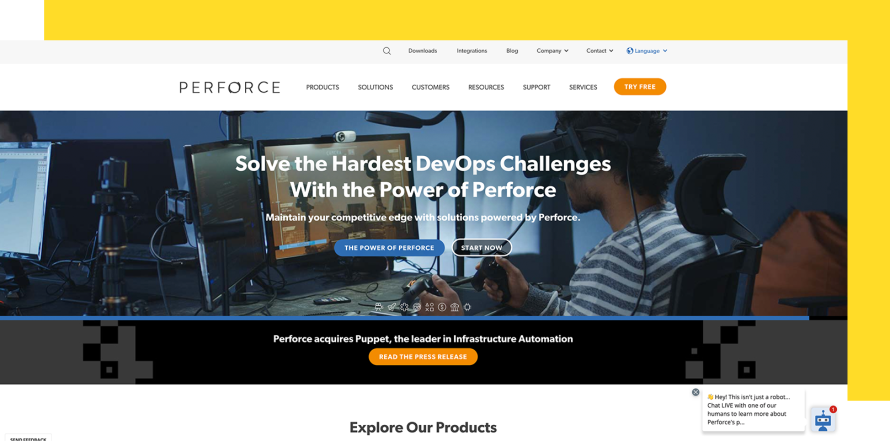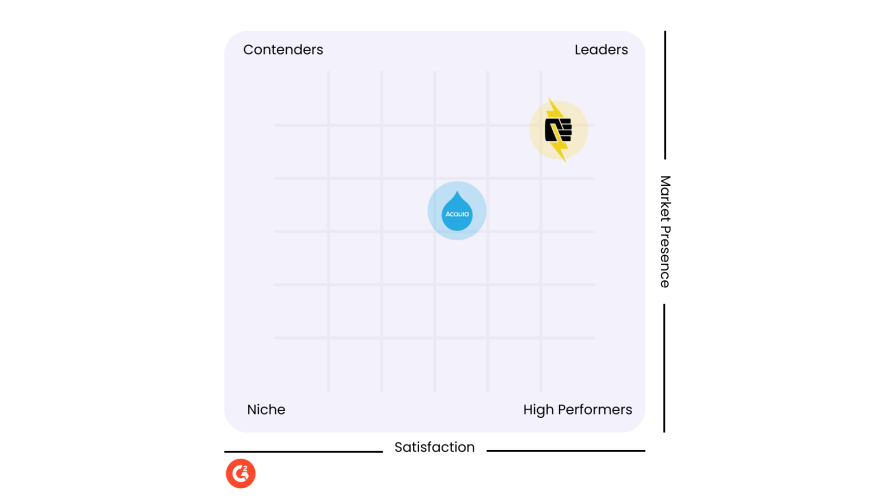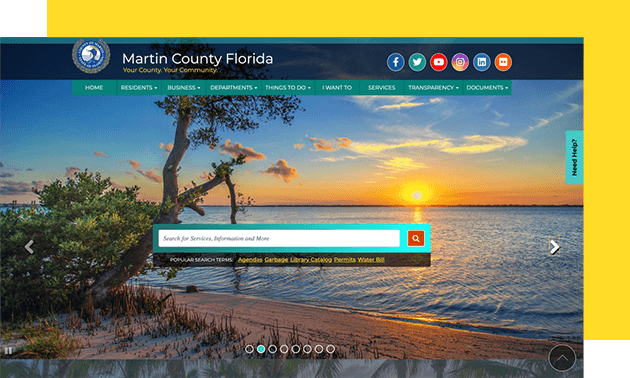Pantheon vs Acquia: A Head-to-Head Comparison
Today we want to compare two well known hosts: Pantheon and Acquia. Here at Pantheon, we’re known for our WebOps platform and superfast hosting for both Drupal and WordPress sites. On the other hand, there is Acquia, recognized as a leading expert in Drupal. But who is the better Drupal host?
It’s true that Acquia holds a notable position in the Drupal ecosystem. It was co-founded by Dries Buytaert, the visionary behind Drupal itself. Acquia's founding team includes core Drupal contributors. This provides early access to Drupal feature releases and development roadmaps. While these close ties underpin Acquia's deep CMS understanding, it's important to note that expertise inside Drupal doesn't automatically translate to superior infrastructure surrounding it.
In 2019, Acquia underwent a significant transformation when it was sold to a private equity firm. This shift prompted organizational changes, leading to the departure of figures who had played important roles in shaping Acquia's identity and founding principles.
According to recent data, Pantheon powers around 0.5% of the top 1,000 sites, with Acquia trailing slightly behind with approximately 0.2%. Although, to be fair to Acquia, our hosting of WordPress sites in addition to Drupal will bolster our market share here.
So, our question remains, who is the better Drupal host? In this article, we explore Pantheon and Acquia in-depth, dissecting features, performance and user feedback. By the end, you should be able to determine which platform best meets your needs.
Pantheon and Acquia: An In-Depth Comparison
Pantheon and Acquia both offer hosting solutions for Drupal websites, but our approaches are quite different. One notable difference is how each company approaches infrastructure.
Acquia chose not to differentiate on infrastructure when developing their enterprise offering. Instead, they used traditional virtual machine infrastructure. This decision made Acquia's solution easily understandable for enterprises, facilitating sales from the get-go. However, this infrastructure choice has long-term implications.
Acquia uses Amazon EC2 virtual machines. Pantheon uses container-based architecture. Container systems provision resources faster than VM infrastructure. This architectural difference affects scalability and how quickly each platform adapts to traffic changes.
Let’s look at these differences a bit closer.
Fundamental Difference: Investing in Drupal or WebOps?
One of the fundamental differences between Pantheon and Acquia lies in their investment focus: Drupal as one element in a DXP suite versus Drupal on a WebOps platform.
Acquia's trajectory has been intertwined with Drupal's development. They were instrumental in funding and steering the completion of Drupal 8, showing a deep commitment to advancing the CMS's capabilities. However, Acquia's focus extends beyond Drupal alone. Over the years, they have acquired several MarTech firms, most notably Monsido, adding them onto their existing platform. While this diversification broadens their service offerings, it also introduces complexities and potential weaknesses.
A prominent example of this approach is Acquia's development of Site Factory on top of Drupal's multisite feature. Using Drupal's strengths, Site Factory inherits its broad weaknesses, especially in the scalability and flexibility of a multisite approach.
On the other hand, Pantheon adopts a wider perspective by investing in WebOps, which is a comprehensive approach to web development and operations. Instead of solely focusing on Drupal, Pantheon's WebOps platform addresses the broader website development and management challenges faced by modern teams.
One of Pantheon's innovative solutions is Upstreams, which tackles these challenges at the layers of Git and containers rather than relying solely on configurations like settings.php. This approach simplifies development workflows, enhances scalability and improves overall performance.
Pantheon's platform also supports multiple CMSs, including Drupal, WordPress and decoupled architecture Next.js, providing a versatile solution that resonates with modern development practices and challenges.
By investing in WebOps, Pantheon offers a more scalable and flexible solution that allows teams to build and manage exceptional digital experiences, regardless of their technology stack. So while Acquia's focus remains deeply rooted in Drupal, Pantheon's goes beyond any single CMS, aiming to revolutionize the entire web operations field.
Fundamental Difference: Acquia Sells a Product, Pantheon Encourages Practices
The core disparity between Acquia and Pantheon lies in our approaches to serving as digital experience platforms (DXPs). Acquia offers a traditional model, while at Pantheon we are proud of our philosophy centered around evolving practices and methodologies.
The Acquia model is: Buy Acquia Site Factory and patchwork of functionality acquired from other products to provide a comprehensive DXP. In contrast, Pantheon has a different idea: Create and maintain your Upstream and distribute it on Pantheon with integrations you choose. While this might initially seem subtle, it yields significant implications.
Numerous organizations have transitioned from Acquia's Site Factory to adopting the Upstream model on Pantheon. Why? Because Pantheon recognizes that delivering exceptional digital experiences isn't just about purchasing a product – it's about practices and methodologies that evolve over time. The Upstream model allows organizations to tailor their digital experiences to their unique needs and preferences rather than being confined to a predefined solution.
Acquia's strategy caters to teams seeking a ready-made DXP, acquiring various component products, features and companies to assemble into a unified offering. However, many organizations soon realize that crafting compelling digital experiences doesn't end with the purchase of Site Factory. The dynamic nature of digital environments demands ongoing adaptation and refinement. The target for success is constantly shifting and evolving. To stay competitive, you need a WebOps platform that allows you the freedom and flexibility to innovate however you want.
Pantheon recognizes that achieving exceptional digital experiences is a continuous process. It promotes a collaborative and innovative environment by cultivating a network of partnerships rather than subcontractors. These partners are motivated to go beyond coding tasks and offer solutions that embrace human ingenuity and creativity, which machines are incapable of replicating.
While Acquia sells a product, Pantheon encourages evolving and adaptable practices.
Analyzing the Key Features of Both Platforms
Let's take a look at the most important features of both platforms.
Image

Pantheon
Pantheon is proud of what it offers its clients and provides a suite of tools to help with website development and management. Here's a breakdown of some of Pantheon's features:
- Multidev: Multidev allows developers to fork the entire stack and work independently. Each developer gets their own environment before merging changes. This streamlines internal workflows and ensures efficient collaboration across development teams.
- Upstreams: Pantheon's Upstreams feature revolutionizes multisite management by enabling efficient deployment of design and shared code across thousands of instances. This is a scaffold for creating new sites, facilitating rapid project initiation and consistent maintenance.
- High-Performance Web Hosting: Pantheon offers high-performance hosting for WordPress, Drupal and Next.js sites, ensuring super-fast content delivery and sub-second page loads.
- Automated Security with Autopilot: Pantheon's Autopilot feature automates finding, testing and applying WordPress and Drupal updates, allowing teams to reallocate resources towards more strategic business initiatives.
- Integrated Version Control: Pantheon removes the hassle of “cowboy coding” by providing integrated version control, allowing developers to maintain control over all code changes while working directly on the platform. Code is immutable in the Test and Live environments, further securing your site.
- Scalable Infrastructure: Pantheon's infrastructure is engineered to accommodate the demands of enterprise-level websites, ensuring seamless performance even in high-traffic scenarios. It features multizone availability and multi-region failover clusters, providing robust support for large-scale operations.
Acquia
Acquia's Cloud Platform also offers a range of features tailored to Drupal development and hosting:
- Site Factory: Acquia's Site Factory aims to make Drupal multisite enterprise-grade by providing a centralized platform for managing multiple Drupal sites. It offers features such as centralized reporting and analytics, customization and extensibility, site cloning and management and automation of updates and security patches. However, it falls short of offering the consistency and efficiency Pantheon provides.
- High-Performance Hosting: The platform includes features like a built-in CDN, enterprise caching and performance monitoring tools such as New Relic APM Pro. Pantheon also offers these features and more.
- Scalable Infrastructure: Acquia's infrastructure is designed to scale with the needs of enterprise-level websites, providing support for high-traffic environments. It offers multizone availability and multi-region failover clusters.
- Security: Acquia provides built-in hardened security features to protect websites and data from potential threats. How does this compare to Pantheon’s advanced security offerings?
While both platforms offer a range of features geared toward Drupal development and hosting, Pantheon's focus on empowering developers with innovative tools like Multidev and Upstreams sets us apart. These features streamline development workflows and enhance team scalability, consistency and collaboration.
Ultimately, the choice is clear: Pantheon doesn't just provide tools; it revolutionizes how you build and manage websites.
Pantheon in Action: Perforce
Image

Perforce, a leading developer of software used by 75% of Fortune 100 companies, faced significant challenges with their web operations, including frequent outages, bot traffic and inefficient developer tools while using Acquia. Despite Acquia’s reputation, their traditional Drupal multisite model and Site Factory did not meet Perforce's needs for scalability and efficient site management.
The turning point came when Perforce discovered Pantheon's Upstreams. “Our issues were solved overnight,” reported Jeremy Pieper, Web Development Manager at Perforce. Pantheon's platform resolved Perforce's stability issues and improved their site performance significantly. As a result, Perforce experienced enhanced developer productivity and reduced IT burdens, marking a substantial improvement in their web operations.
User Experience: Reviews and Ratings
Image

Both Pantheon and Acquia have earned the prestigious title of Leader for Winter 2024 by G2, the world’s largest tech marketplace and a trusted source of authentic, unbiased reviews. User reviews reveal distinct strengths for each platform.
Users praise Pantheon for ease of use and responsive support. Users praise Acquia for enterprise infrastructure and Drupal expertise. Users also note Pantheon may have fewer built-in marketing tools. Users note Acquia can feel less personal for smaller organizations.
Pantheon’s Strengths
Customers consistently praise Pantheon's outstanding user experience. We stand out as a preferred choice among users with commendations for exceptional customer service, a user-friendly interface and excellent test environments.
Martin Beck, Executive Director of Strategic Marketing and Communications at the Soka University of America, expressed his satisfaction with Pantheon's approachability, contrasting it favorably with his experience with Acquia:
"Pantheon is more approachable. With Acquia, I felt our contract was an afterthought. We were a tiny fish in a giant Acquia pond, but with Pantheon – we are an octopus!"
Pantheon provides direct account management across plan tiers. Acquia's support model prioritizes enterprise customers. This affects how smaller organizations experience vendor relationships.
Public reviews further validate Pantheon's superiority, with higher ratings compared to Acquia across various platforms. For instance, on Gartner, Pantheon has an impressive 4.6 out of 5 ratings, compared to Acquia's 4.3.
Acquia’s Strengths
Credit where credit is due, Acquia also receives positive feedback, particularly for its infrastructure and a suite of tools tailored to enterprise needs. However, some users feel Acquia's service can be less personal and only geared toward larger clients.
Acquia's strengths lie in its high availability, global delivery and enterprise-level security, which are important for large-scale operations. The platform's multi-zone architecture and extensive global regions ensure that applications remain highly available and performant.
While both platforms offer great Drupal hosting and development solutions, Pantheon’s additional focus on user experience, innovative tools and responsive support is why so many people rate it highly. Pantheon creates an environment where developers and marketers can thrive, innovate and deliver exceptional experiences.
Pricing: Value for Money Assessment
Everyone wants value for money, so how do these two compare in terms of cost?
Pantheon
Image

Pantheon offers various pricing plans catering to different business sizes and needs. Our tiered pricing structure includes Silver, Gold, Platinum and Diamond plans, each with varying features and resource limits. This flexibility allows businesses to choose the most suitable package for their requirements.
- Silver plan: This is a great plan for individuals and starts off completely free!
- Gold plan: Great for small teams and offers on-demand environments, automated updates and visual testing and 24/7 support.
- Platinum and Diamond plans: Perfect for mid-market to enterprise teams, this plan offers decoupled architectures, advanced Global CDN, daily updates and priority support.
Pantheon also offers a free trial, allowing users to try the platform without commitment. Payment is only charged when users connect their domain to the platform, ensuring a risk-free evaluation process!
Sean Larkin, CEO of ThinkShout, praises Pantheon's performance and competitive pricing:
"The out-of-the-box performance is really high compared to other offerings. Also, the pricing is significantly more competitive. The total cost of ownership on these sites is lower, too, because of the infrastructure Pantheon provides."
Acquia
Acquia offers premium-only subscriptions designed for enterprise-level organizations. Acquia's pricing includes bundled marketing automation and DAM tools. The enterprise focus and integrated tooling drive higher costs than hosting-only platforms. Acquia requires contacting sales for pricing. Enterprise plans typically start in the mid-to-high five figures annually. Although they do offer a free trial like Pantheon, you have to sign up for the trial even to get prices.
Pantheon in Action: Martin County
Image

Martin County, Florida, is a prime example of using technology to ensure public safety and effective communication, especially during emergencies such as hurricanes and floods.
Located on the Atlantic Coast with about 160,000 residents, Martin County faces frequent floods, rising sea levels and seasonal hurricanes. During crises, residents depend on the county’s website for critical information on power outages, evacuations and safety measures.
To ensure a reliable and accessible website, Martin County transitioned from its Acquia hosting to Pantheon. This move proved invaluable, especially during emergencies, as the website became a crucial tool for real-time alerts and safety information.
Pantheon’s platform ensured steady uptime during peak traffic, such as hurricanes and the COVID-19 pandemic. Jennifer Hagedorn, Web Content Analyst at Martin County, praised Pantheon, stating, “Pantheon's proactive communication and prompt support facilitated efficient issue resolution.”
Hagedorn also praised Pantheon’s WebOps for allowing a more streamlined workflow, “We didn’t have [Multidev] on Acquia, and sometimes we had problems with content getting erased,” she said. “Now, on Pantheon, we have a more agile process…It’s super helpful!”
Your Next Action: Choosing the Right Drupal Hosting
When it comes to Drupal hosting, Pantheon stands out with a suite of powerful features that set it apart from the competition:
- Reliability and Performance: Pantheon’s high-performance hosting ensures lightning-fast page loads and great website experiences, even during peak traffic.
- Agile Development: With features like Multidev and integrated version control, Pantheon revolutionizes development workflows. Quickly fork, develop and merge code changes without disrupting your live site, ensuring efficient and agile updates.
- Rock-solid Security: Pantheon’s security measures, including dedicated HTTPS certificates and continuous monitoring, protect your website from potential threats and cyberattacks.
- WordPress Compatibility: Pantheon supports WordPress, Drupal, and Next.js sites. Acquia only supports Drupal. Organizations running both WordPress and Drupal benefit from Pantheon's unified hosting. This eliminates the need for multiple hosting vendors and reduces administrative overhead.
- Positive User Reviews: Pantheon consistently outperforms competitors like Acquia in customer reviews, earning praise for its exceptional customer service, user-friendly interface and reliable performance. Users love the proactive support and innovative tools that make their lives easier.
Don’t just take our word for it, try it out for yourself with a free trial or get in touch for a customized quote. Pantheon is here to elevate your website performance and streamline your development processes today.
Frequently Asked Questions
What is the Acquia platform?
Acquia is a digital experience platform that provides Drupal hosting with integrated marketing tools. The platform includes content management, marketing automation, and digital asset management capabilities.
What extra marketing and digital experience tools does Acquia include that Pantheon doesn't?
Acquia bundles marketing automation through Mautic, digital asset management through Widen, and accessibility monitoring through Monsido. Pantheon focuses on WebOps and does not include integrated marketing or DAM tools.
From a developer's perspective, how do Pantheon and Acquia compare on tools and workflow?
Pantheon provides Multidev for independent development environments and integrated Git workflows. Acquia provides Site Factory for multisite management and centralized deployments. Both platforms offer version control. Difference-wise, Pantheon emphasizes giving each developer isolated environments within a unified platform while Acquia emphasizes managing multiple sites from a single administrative interface.
When would I choose Pantheon over Acquia for my project?
Choose Pantheon for multi-CMS support, developer-centric workflows, and and content workflow management through Content Publisher. Choose Acquia for Drupal-only hosting with integrated marketing tools and enterprise compliance features.
What type of business is the ideal customer for Acquia's platform?
Acquia serves enterprise organizations with dedicated Drupal teams. Large corporations with complex compliance requirements are typical Acquia customers.
Which platform offers better performance and uptime guarantees for a high-traffic site?
Both platforms provide 99.95% uptime SLAs on enterprise plans. Both offer multi-zone availability and multi-region failover clusters. Pantheon emphasizes sub-second page loads through container architecture, while Acquia provides enterprise-grade performance through VM infrastructure.